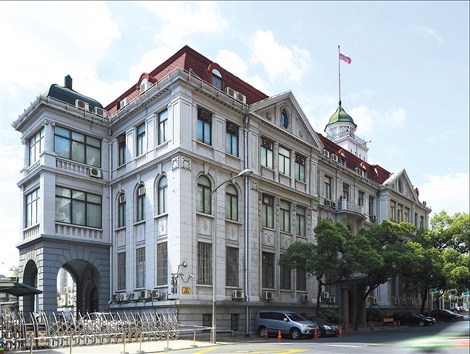

A recent photo of the Consulate General of Russia in Shanghai, which dramatically opened and closed for several times during the past century. — Zhang Xuefei
The Consulate General of Russia in Shanghai has been opened and closed many times since 1917, reflecting twists and turns in history and ups and downs in diplomatic relations. Michelle Qiao reports.
Prelude
Enchanted by Helen Foster Snow's vivid memories of the Bund, I am launching "Bund II," a series that begins where she began her China journey, the former Astor House Hotel.
"Shanghai is a marvelous place for an enterprising young person with ideas. It is a total loss for many things, but I see so many opportunities that I can hardly decide what to do ..." wrote Snow (1907-1997).
Dreaming of becoming a writer, this ambitious and attractive American girl traveled 8,104 kilometers to land in Shanghai in the summer of 1931. She met Edgar Snow (1905-1972), author of "Red Star Over China" on the first day and married him one year later. The Snows interviewed top Chinese Communist leaders and became famous writers.
In 20 articles, I will explore historic buildings and other "relics" in the north Bund area, places Helen Foster Snow might have visited. It was in the sweeping river breeze of the Bund that Edgar Snow proposed to her.
The new series covers a range of structures, including offices, hotels, club, a church and a bridge. It will introduce cultural and religious buildings on Yuanmingyuan Road, known as the "Cultural Bund," echoing the commercial and financial Bund on Zhongshan Rd E1.
In the "Bund I" series, the 23 waterfront buildings lined the Huangpu River. In "Bund II," my stops will form an irregular circle as shown on the map.
So let's head out on this new journey from the starting point of an American girl who traveled thousands of kilometers for a dream that did come true in the Orient.
Among Shanghai's rainbow of consulate buildings, the gray, red-roofed Russian Consulate General fronting the Huangpu River is one of the most dramatic.
Though it was built for and is still used as the Russian Consulate General in Shanghai, the architectural history of the grand building has been filled with twists and turns over the past century.
It stands at the confluence of the Huangpu River and Suzhou Creek and can be appreciated from the Waibaidu Bridge.
Red roofing tiles contrast with the pale gray facade, which has a solid, severe look.
It was erected in 1916, designed by German architect Hans E. Lieb who adapted Baroque and German Renaissance elements for the 3,264-square-meter structure.
According to Vice Consul Sergey V. Androsov, the first Shanghai consulate of the Russian Empire was established in 1896, however, at that time the buildings were sprinkled in different parts of the city.
A fire in 1904 in one building destroyed valuable archives.
"Soon after his appointment in 1911, the new Consul General Victor Grosse reported to the Czar on Shanghai's geographic and economical importance. The Czar approved Grosse's plans for Shanghai, one of which was to build the new consulate building," says Androsov.
The four-story structure was built in 1914, completed in 1916 and formally opened in January 1917.
"It was one of the most beautiful Russian consular buildings in all countries," Androsov comments.
Only months after the grand opening, however, the 1917 Russian Revolution broke out and all Russian embassies and consulates overseas were closed, including the one in Shanghai.
In 1924, the Shanghai consulate of former Soviet Union reopened but closed in 1927 because of insecurity in the city controlled by the Kuomintang regime.
Copyright ©1999-2018
Chinanews.com. All rights reserved.
Reproduction in whole or in part without permission is prohibited.